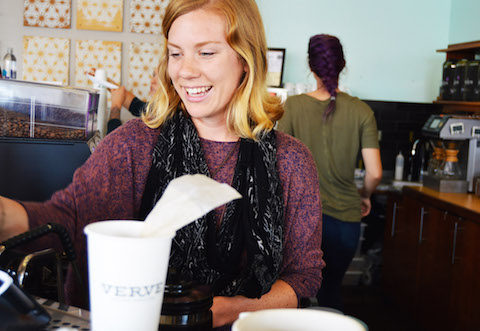When Katie Slocum, an anthropology major at UC Santa Cruz, got her first espresso fix at Verve, the specialty Santa Cruz coffee bar, she had no idea that a year later she would be following the company to a Honduran mountaintop on a journey through the coffee supply chain.
At the time, Slocum, who grew up in Sonora, knew she desperately wanted to work for the thriving local coffee company. Within a few months of tasting Verve’s special beans, she was a barista at the company’s bustling Capitola location.
Slocum’s passion for coffee developed an academic buzz beginning with the company’s new employee orientation. Colby Barr, co-owner and the company’s green buyer, called his new baristas to action: how can they help his company better connect coffee customers (“street level”) to growers (“farm level”)?
As Barr explained his commitment to bridging two opposite sides of the supply chain through buying directly from the source, “I knew I was getting into something bigger than myself,” Slocum remembered.
Fair trade vs. direct trade
The more she learned about the cultural and economic disparities between fair trade versus direct trade and the disconnect between consumer and grower, the more questions she had.
While direct trade can provide extra money and resources to farm producers, what happens when relationships go bitter? Who ultimately carries the burden of environmental damage, drought, low cupping scores – all volatile factors in farm production? What options are available to farmers when Verve and other suppliers decide not to purchase?
And so Slocum’s senior thesis, From Streetlevel to Farmlevel: An Ethnography of Direct Trade Coffee in Santa Barbara, Honduras was born. Why not learn more about her employer through an ethnographic project?
Slocum proposed a bold idea: what if Verve were to sponsor her on a research trip to Honduras to study just how the company’s direct trade practice impacts producers, their families, and the people across the supply chain?
“Katie has what I like to call ‘the eye of the tiger,’” Barr said in an email interview. “When Katie pitched her concept, I was really impressed. It was the first time that we had one of our team put together such a thoughtful presentation on what she wanted to accomplish. She was even wearing her business suit!”
Central American journey
And so, in spring of 2014, Slocum travelled with Barr to Honduras. From a long Guatemalan layover to trucking through backcountry roads of the Honduran countryside, then hiking when the roads ended, and finally trekking up mountain trails, Slocum was able to see the impact of Verve’s business approach.
Through buying direct, Verve is able to offer a better product to consumers and better prices for farmers. Slocum heard from one of Verve’s suppliers that the quality of specialty coffee has increased as a result of direct trade. When beans are sold to a fair-trade cooperative, they are blended with other farmers’ crops, any unique flavor is lost. Offering distinct beans can earn farmers who sell directly to Verve up to three times more than its fair-trade partner.
Slocum also witnessed some troubling dilemmas of buying direct. As she saw crops decimated by la roya, a fungus infestation that is ravaging coffee plantations across Central America, she wondered what happens to a farm with unsellable beans? Without the guarantee that a fair-trade cooperative provides, what insurance policy do farmers have? How does Verve balance its commitment to the growers with its promise of quality product for consumers?
As she described in her thesis: “From the experience I’ve gained standing on those farms, shaking the hands of the producers that supply Verve, I’ve learned that humans have a moral imperative to support fellow humans, transcending nefarious backgrounds of colonial mercantilism and envisioning a future where the supply chain becomes more of a partnership, where people in both the Global North and the Global South can enjoy the benefits of a highly lucrative international enterprise.”
A transformation
The trip transformed Slocum’s relationship to coffee, personally and professionally. As Barr observed, “I learned a lot from Katie's project. One thing was the reaffirmation of the power of origin to coffee professionals. It's one thing to love coffee, but once you visit the source it grabs hold of you in a way that is hard to explain and that never lets go. It's a powerful experience.”
Now that she has graduated, Slocum plans to continue improving the relationship between consumer to buyer. She published her project online, with the hope that it can be a digital resource for coffee consumers, professionals, public, and academics alike.
Slocum’s thesis won the 2015 Social Sciences Dean’s Award for Excellence in Undergraduate Research.



